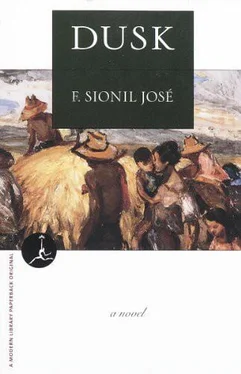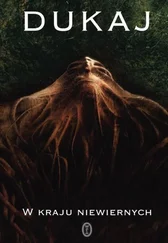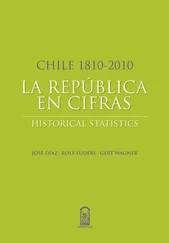Then, after a while, the cart stopped. From the rear of the cart, Dalin took the oil lamp out. It had not been used for a long time and the wick was dry, but soon it sputtered into a flame. She brought the lamp to the front.
Istak lay down. The light cast patterns on the canopy. The ride was smooth; they were no longer on rough ground or fallow fields but on the cobbled Spanish road, a light proclaiming their presence — persons of peace on a long journey. They were moving slowly, steadily, the wheels creaking, Dalin before him framed by the doorway of the cart, and beyond, the night dangerous and vast; Dalin near him, comforting him with her presence, easing the knot in his heart.
They had rehearsed what they would say — they were newly weds going to settle with relatives in Pangasinan. As for their being married, “I hope it will be true someday,” Istak told her.
He slept fitfully and though he often asked Dalin to lie down while he kept watch, she had refused. Once, he woke up to find that the cart was not moving, that the shadows the lamp cast were still. The bull was chewing its cud but Dalin was nowhere. He half rose in fright and saw that they were by the roadside, and Dalin was seated on a rock, resting the bull, while below them, the waves murmured on the rocks and the air was salty and clean.
“Please come and sleep now, and I will watch,” he said. Dalin mounted the cart again.
“We have passed the two posts where we should have been checked,” she said softly. “There”—she pointed to the distance where a lighthouse beam shone—“that was the last one.”
“And they did not stop you?”
“Who would bother with a cart at this time of night? The sentries were probably all asleep.”
He was right, then. The other carts must have passed the sieve.
Morning comes to the Ilokos quickly, the sun rising from beyond the mountains and flooding the land with amber light. They were still on the Spanish road, for in this part of the country the mountains and the sea often meet, and the narrow road followed the coastline through narrow plains and villages that had begun to stir.
To their right, a few fishing boats sat motionless in the water, while beyond, a ship with smoke trailing long and black from its funnel headed toward the north. Perhaps it was one of the Spanish boats headed for Aparri, or even to Hong Kong. Toward midmorning, six horsemen followed by four carriages came thundering down the highway. One of the horsemen roared at them to get off the road and, for an instant, fear gripped Istak. But the man merely wanted the road to be cleared, for soon after Dalin had dismounted and led the bull aside, the four carriages rolled on, their well-dressed passengers chatting, among them a priest — perhaps a bishop, in his resplendent finery, on his way to officiate at some festivity.
Where possible, Dalin took the cart away from the main road and then ventured through seaside hamlets. This was what traders often did and in each she asked if there was any dried fish she could buy. For traveling, it was much better than dried meat, as it was not likely to spoil quickly.
By nightfall, they had to be on the road again. They were near the Abra River now. Istak knew this almost by instinct, and if it had been the rainy season, they would have had to cross the river by ferry. The river would be dry in parts and where the water was still running it would be shallow. There would be many travelers along the stretch of riverbed, for there they paused to cook their meals and do their washing before journeying onward to La Union and Pangasinan.
They stopped for the night in a village far from the road, their presence known to the villagers who on occasion would receive travelers seeking company and perhaps protection from the highwaymen who roamed these parts. And in the early dawn, long before daybreak, Dalin hitched the cart again.
They reached the river before noon. Bit-tik, who had waited along the road, rushed to them breathless with the good news: they had all managed to get through the eye of the needle — they were together again, farther along, down the wide are of the riverbed, hidden by tall grass.
Dalin took the cart down a well-traveled gully. Along the way, close to the narrow stream of water, were the ashes of cooking fires, traces of a night’s habitation, laundry spread out in the sun to bleach on the stones, women washing their hair, and children splashing about.
There were a few Igorots in loincloths. It would be a long way back across the mountains to their villages and for the moment, they were here in peace, although once in their own domain, they could be the fiercest hunters of heads. They could be Tinguianes, Istak told Dalin, who cringed when one of them approached the cart, baring teeth stained by betel nut, and asked in Ilokano if they had any sugar to sell.
They had none, of course, and after he had left and joined his companion, Istak assured Dalin she was in no danger, not while Bit-tik was with them. “Toward that turn of hill, that is where they are waiting,” Bit-tik told them, pointing. They would get there by noon.
All of them had bathed and their faces shone. But no one lived here, they said; who would be able to grow anything on this desert of pebble and sand? Even the camachile trees remained stunted.
Ba-ac would tell them again and again afterward how he had fooled the Guardia, how everyone was asleep at the first station except for one sentry. He had approached the sentry and asked first if he could have a drink, and after that, if he could just rest his tired legs and, perhaps, go to sleep nearby till daybreak, for here he felt completely safe — what with the rice and, perhaps, his only good shirt in the sack — he, a defenseless old man. He would relate many times till everyone knew it by heart, how the sentry did not even bother asking him where he came from, but had, instead, complained about the mosquitoes that infested the air, while below, the waves slapped sonorously and soon lulled him to sleep. In the early dawn, Ba-ac had asked if there were more sentries down the road where he could possibly rest again, and he was told there were a couple more, but who would travel on foot at this time except a crazy old man worrying about something as trifling as a few gantas of rice?
In the evening when they made ready to leave the riverbed, Ba-ac came to see him again. “You are much better, son,” he said. “You are no longer as pale as a banana stalk. It is good that you have Dalin to take care of you. Now, at least, you can sit up and show us the way. You know it better than any of us, at least all the way to Candon. And from there, Dalin will be our guide.” Ba-ac turned to the woman who was leading the bull to the yoke. “You are one of us now, young woman,” Ba-ac told her warmly.
“Thank you, Apo,” she said.
“Where is An-no, Father?” Istak asked. He could not forget how his younger brother had railed against him, how he wanted Dalin for himself.
“You are brothers,” Ba-ac said. “There is no distance between you that cannot be bridged.”
It was a cryptic reply. Did the old man know of the rift between the brothers that Dalin was the center of? Did he know how Mayang had looked at his relationship with Dalin to be as ominous as sin?
They would no longer use the Spanish road; again, they would take the circuitous route close to the foothills, away from the towns. They still had a long way to go before they reached Candon, where Ba-ac had second cousins who would probably give them shelter for a day. A long journey ahead still, and no peace with An-no in sight, only this silence and this distance that could widen if he did not move wisely.
It was all routine now, the women cooking the meals, the men walking ahead and behind the carts, particularly where the grass was dense and the farms far between, places where brigands could lie in wait.
Читать дальше












